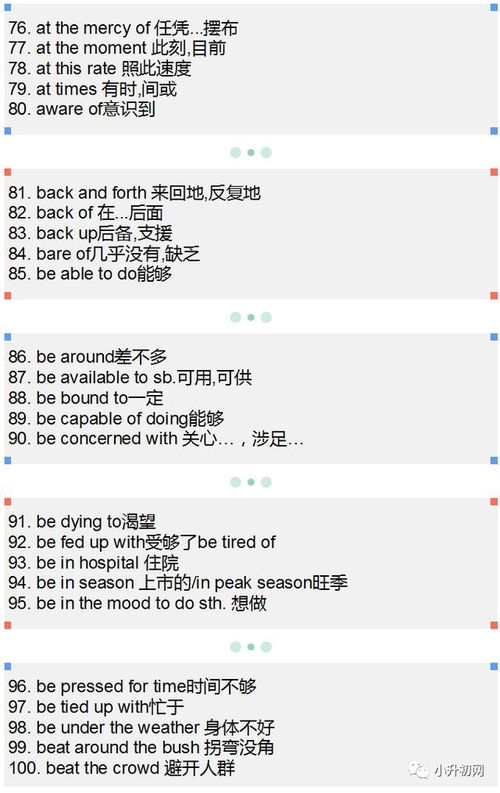小升初英语常用句子,小升初英语重要语法知识点总结
推荐文章
小升初英语常用句子目录
1. Hello, my name is _____.。
2. Nice to meet you.。
3. How are you?。
4. I'm fine, thank you.。
5. What's your favorite color/food/animal?。
6. I like _____.。
7. Can you help me, please?。
8. Excuse me, where is the restroom?。
9. I don't understand. Can you say that again?。
10. Thank you for your help.。
11. Good morning/afternoon/evening/night.。
12. Have a nice day!。
13. See you later.。
14. What did you do over the weekend?。
15. I went to _____.。
16. What are you going to do this weekend?。
17. I'm going to _____.。
18. How was your day today?。
19. It was _____.。
20. I'm sorry, I didn't mean to do that."。
小升初优秀作文:英语作文小句子整理

小升初优秀作文:英语作文小句子整理
在平日的学习、工作和生活里,大家肯定对各类句子都很熟悉吧,借助句子,我们可以更好地表达。
那么什么样的句子才是好的句子呢?下面是我整理的`小升初优秀作文:英语作文小句子整理,仅供参考,大家一起来看看吧。
What do you want to buy? (你要买什么呀?)
真累啊!
I‘m tired.
I‘m exhausted. (我精疲力尽了)
I‘m pooped. x俚语
晚饭你想吃什么?
What would you like for dinner?
What would you like for dinner? (晚饭你想吃什么?)
How about steak? (吃牛排怎么样?)
What do you want for dinner? (晚饭吃什么?)
What do you want to eat for dinner? (晚饭你想吃点什么?)
你能帮我准备餐具吗?
Would you help me set the table? xset the table是将刀、叉和杯子在桌子上摆好,准备吃饭的意思。
Would you help me set the table? (你能帮我准备餐具吗?)
I‘d be happy to. (乐意之至。
)
Help me set up the table, will you? (你能帮我把餐具摆好吗?)
晚饭做什么好呢?
What should I make for dinner?
What should I whip up for dinner?
What should I cook for dinner?
What should I fix for dinner?
还是家好哇。
还是家好哇。
It‘s good to be home.
There‘s no place like home.意为“哪儿也没有自己家好”,是句常用的谚语。
It feels so good to be home.
你能不能赶紧去趟商店?
Would you run to the store?不见得是“跑着去”,在这儿是“快点儿去”的意思。
Would you run to the store? (你能不能快点儿去趟商店?)
;
小升初英语重要语法知识点总结
小学《新标准英语》教材中涉及的`重要语法知识主要有8种:to be句型、there be句型、一般现在时句型、现在进行时句型、一般过去时句型、情态动词can/could/should引导的句型、一般将来时will/be going to句型、祈使句等,其中多种语法现象广泛出现在各册教材中,现以五、六年级教材为例将重点句型归类介绍如下:
l to be句型:主要用于介绍个人情况如姓名、健康状况、身份、家庭成员、朋友、职业;描述事物特征;表达方位、长度、年代、颜色、季节、时间、某人的物品及感觉等,该句式广泛分布于各册教材中,其中第1、2册更是以此句型为主,9-12册中这类“四会”句型有:
1. This one is heavy.
2. It’s an autumn festival. It’s really fun.
3. It isn’t hers. It isn’t his.
4. Whose T-shirt is it? It’s mine.
5. Are you sad? No, I’m not.
6. What’s the matter? Nothing.
7. I’m sorry.
8. This black bag is nice. It’s big.
9. It’s very heavy. Look at this green one. It’s light.
10. How long is the Great Wall?
11. It’s ten thousand li long.
12. How old is the Great Wall?
13. It’s more than two thousand years old.
14. Thanksgiving is my favourite.
15. Families are together.
16. They’re deaf.
17. This water is very clean.
18. It’s fun to drink this way.
19. How much is it? It’s thirteen dollars and twenty-five cents.
20. What’s the matter?
21. I’m really excited.
l there be句型:包括现在与过去两种,即:there is/are, there was/were。
用于
表达某处有某物的客观存在关系。
该句型主要分布在Book5,Book9, Book11和Book12中,教材中以陈述句与how many引导的特殊疑问句问答为主。
五、六年级教材中该类重点句有:
1. There weren’t any swings here before.
2. There was only a slide.
3. There wasn’t a pond here before.
4. There is one now.
5. There are many sweets.
6. There are many fruits, too.
7. There is a Chinatown in New York.
8. There was a big lake and there were lots of ducks.
